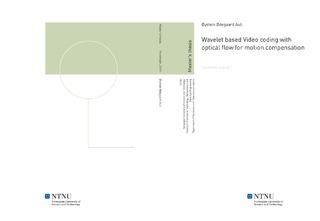Wavelet based Video coding with optical flow for motion compensation
Master thesis
Permanent lenke
http://hdl.handle.net/11250/2370315Utgivelsesdato
2011Metadata
Vis full innførselSamlinger
Sammendrag
In broadcasting environments intra-only video coding with JPEG 2000 has shownto provide many desired features along with high picture quality. However, thereis no exploitation of temporal redundancy, which can reduce the bit rate whilemaintaining the quality.Optical flow algorithms are designed to find the apparent movement of brightness inan image, and can be used to estimate the motion of each pixel between consecutiveimages. This thesis explores the performance of a hybrid video codec that uses the Classic+NL optical flow algorithm for motion compensation and JPEG 2000for encoding the estimation error.The motion estimation proved to be inaccurate at the edges of objects. This cancause high frequency components in the residue image, which will decrease theefficiency of JPEG 2000. Occluded regions will also have poor estimation, as theyare not present in the previous frame. Since noise is not considered when the opticalflow is calculated, the energy of the noise may increase after motion compensation.Without addressing these issues, optical flow algorithms are not well suited formotion estimation in hybrid video codecs.Even with the inaccurate motion compensation performed by the optical flow algorithm,there was an overall reduction in bit rate of 18.8%, compared to intra-onlycoding with JPEG 2000. The performance was highly content dependent, rangingfrom a reduction of 90% to an increase of 27%. The reduction comes at a cost ofincreased delay, higher complexity, vulerability to transmission errors, and a lackof a constant bit stream. The proposed hybrid codec is therefore not suited toreplace intra-only coding with JPEG 2000 in contribution environments.
